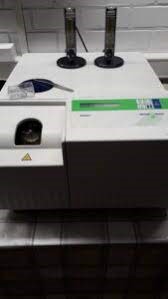Differential Scanning Calorimetry (DSC)

Differential scanning calorimetry (DSC) enables the measurement and study of the thermal properties of materials such as glass transitions, and melting and crystallization points. Furthermore, thermochemical parameters such as thermal curing, heat history, specific heat capacity, and analysis of the quality and purity of materials are also measurable. For example we can estimate the percent crystalline content of a polymer from the crystallization/melting peaks of the DSC graph using reference heats of fusion easily found in the literature. Moreover, impurities in polymers can be determined by the analysis of anomalous peaks that appear in the thermograms. The existence of plasticizers in plastic materials can be detected thanks to their characteristic boiling points. In addition, the study of minor events in first heat thermal analysis data can be useful as these apparently anomalous peaks can in fact also be representative of process or storage thermal history of the material or polymer physical aging. Comparison of the heat data collected in two or more heating cycles at consistent heating rates can allow us to learn about both polymer processing history and material properties.
The heat-flux calorimeter DSC-1 (Mettler Toledo, Gießen, Germany) measures materials from -130 oC to 500 oC at different heating and cooling rates (between 1 oC/min to 40 oC/min) in standard sealed aluminum containers.